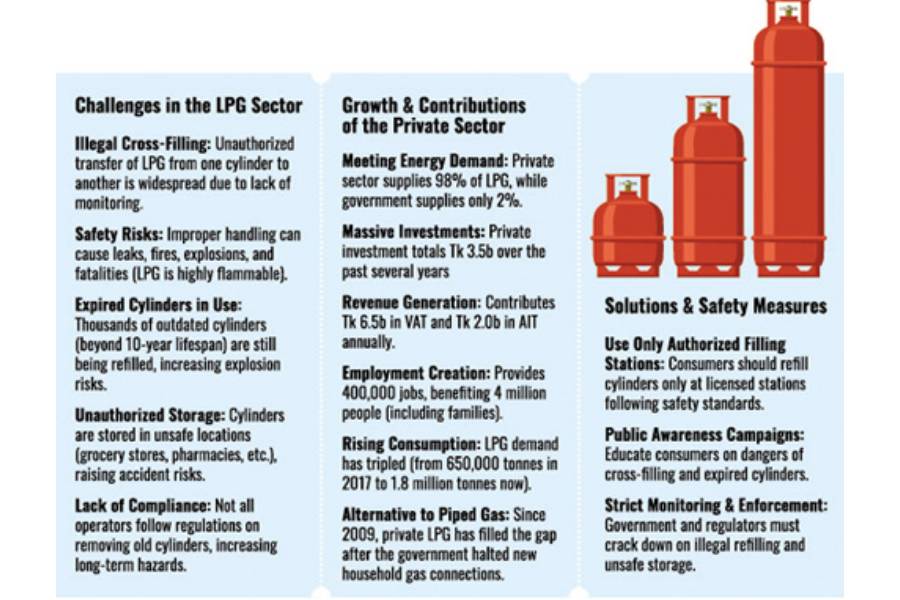
Published :
Updated :

The growing liquefied petroleum gas (LPG) sector in Bangladesh is facing numerous challenges, especially the illegal cross-filling due to lack of monitoring and awareness.
Cross-filling, which means transfer of LPG from one cylinder to another, is being done by many unauthorised individuals or unregulated businesses across the country. It may lead to a disaster anytime risking the lives of consumers and public, it has been alleged.
Improper handling and inadequate equipment can lead to leaks, fires, explosions, and even loss of life as LPG is highly flammable.
Thousands of such LPG gas cylinders are being used across the country although their tempers are expired.
But these cylinders are being repeatedly refilled and sent to customers’ homes, increasing the number of gas explosions and casualties in the country.
The chances of major accidents in the future remain high as the trend of removal of old and hazardous gas cylinders from the market is very low.
Cylinders are being stored in various locations without proper authorization. They are stocked in grocery stores, pharmacies, and other shops, posing serious risks. This situation has led to growing concerns among consumers, as unexpected and deadly gas explosions continue to occur. Experts warn that if this issue is not addressed immediately, more accidents are likely to happen in the future.
However, experts believe that after 10 years, cylinders become increasingly dangerous.
Although some companies remove hazardous cylinders after 10 years, but this has never been maintained by all operators.
To ensure safe use of LPG cylinders and check its cross-filling, the consumers should only refill their LPG cylinders at authorised and licensed filling stations, which usually maintain safety standards.
Public awareness campaigns are also necessary to educate consumers about the dangers associated with LPG cylinder cross-filling.
It is important for individuals to understand the risks involved and to prioritise their safety by choosing legal and regulated sources for LPG cylinder refills.
Bangladesh’s dependence on liquefied petroleum gas (LPG) to meet mounting energy demand in households, automotives, commercial entities and industries is growing consistently due to relentless efforts by the private sector.
The private sector itself is developing necessary infrastructure and ensuring a smooth supply chain to take this clean fuel to the doorsteps of end-users investing billions of taka.
The private sector currently imports over 98 per cent of LPG needed to meet the domestic demand at their own costs, while only around 2.0 per cent is arranged by the state-owned LP Gas Ltd, a wholly-owned subsidiary of Bangladesh Petroleum Corporation (BPC).
The proactive role of the private sector in meeting the country’s growing energy demand by supplying LPG provides the much-needed relief for the government as a significant portion of energy demand is being met by the private sector without any subsidy.
The LPG sector is a capital-intensive one and the private sector has invested around Tk 3.5 billion over the past several years to meet the growing demand for LPG by different sections of consumers, according to the LPG Operators Association of Bangladesh (LOAB).
Moreover, they provide around Tk 6.50 billion in value added tax (VAT) and Tk 2.0 billion in advance income tax (AIT) annually to the government exchequer—National Board of Revenue (NBR).
Privately-owned LPG operators have so far provided around 400,000 jobs and some 4.0 million people including their families are directly benefitted.
Driven by large investments in the private sector, LPG consumption in Bangladesh has almost trebled over the years.
Bangladesh currently consumes around 1.80 million tonnes of LPG annually, against around 650,000 tonnes of LPG during 2017.
The LPG market in Bangladesh started growing significantly after a government decision to suspend piped gas connections to household consumers in 2009.
Despite the ban on household gas connections for a long time, the government did not have to face any significant resentment from the consumers as the privately-owned LPG operators have come up to meet the household demand for cooking fuel.
LPG consumption in automotives, restaurants and other commercial entities increased afterwards to cope with the country’s mounting energy demand and dwindling natural gas reserves and production.
To accelerate further the consumption of LPG, ensuring its safe use is of utmost necessity.


 For all latest news, follow The Financial Express Google News channel.
For all latest news, follow The Financial Express Google News channel.